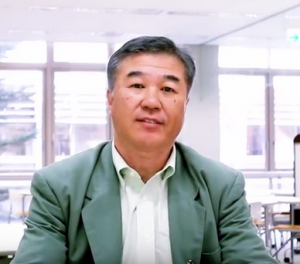Interview with Professor Tomoyuki Yoshida, Spring Term Grant Recipient
Senior Associate Professor of linguistics, Dr. Tomoyuki Yoshida, is one of five ICU faculty members to receive a grant from the JICUF during the spring term. He has been awarded ¥600,000 to host the Workshop on Altaic Formal Linguistics (WAFL) at ICU in spring 2017.
The WAFL conference was started by ICU alumnus and MIT Professor Shigeru Miyagawa (who was also ICU’s 60th Anniversary professor) and Professor Jaklin Kornfilt of Syracuse University in 2003. Since its inception, the conference has mostly been held in the U.S. and Europe, and the only time it was held in Asia was in 2009 at Nagoya University. It is apt that ICU, with its strong linguistics program which has produced numerous renowned theoretical linguists, should host the 13th conference. We believe it will be an exciting opportunity not only for the linguistics department and its students, but for the entire ICU community.
Dr. Yoshida was kind enough to answer a few questions about the program.

JICUF: First of all, congratulations on being awarded the JICUF spring term grant! For those of us who are not familiar with Altaic languages, could you tell us a little bit about what they are?
Prof. Yoshida: The most standard current classification of the Altaic languages includes Turkic, Mongolic, Tungusic, Koreanic and Japonic languages. The geographic distribution of these languages ranges over East, North, Central and West Asia, and Eastern Europe. Inclusion of Korean and Japanese in this language family became standard relatively recently. All of these languages share linguistic properties of having the same basic word order (Subject-Object-Verb) and agglutinative word internal structures.
JICUF: Please tell us about your own research focus and how it fits into the field of Altaic linguistics.
Prof. Yoshida: I have been working on various syntactic issues of Japanese and other languages within the framework of generative grammar. To investigate core properties of the faculty of language (assumed to be a human biological endowment), comparison of languages of the same type sometimes provides deeper insights and helps us better understand syntactic behaviors exhibited by other types of languages. So, I have been paying attention to cutting edge theoretical research on Turkish, Mongolian, Korean, Japanese as well as other languages.
JICUF: What do you hope to achieve through hosting this workshop at ICU? What are you most excited about?
Prof. Yoshida: ICU has a strong tradition in theoretical linguistics. Hosting the conference “Workshop on Altaic Formal Linguistics” (WAFL) at ICU in May 2017 will allow our students to receive intellectual stimulation from leading researchers in theoretical linguistics. We already know this from our recent experience of hosting the 7th meeting of Formal Approaches to Japanese Linguistics (FAJL) at ICU in June 2014. It was made possible with our co-host, (National Institute for Japanese Language and Linguistics (NINJAL), and a generous financial support from JICUF. The conference was a great success with many ICU graduates actively participating in the conference. So, FAJL provided a venue for an ICU linguistics reunion and greatly stimulated our students. I anticipate a similar success for WAFL next May. I am also excited about having Professor Jaklin Kornfilt (Syracuse University) as one of the keynote speakers. Professor Kornfilt is a prominent scholar in Turkish linguistics and one of the two co-founders of WAFL. The other co-founder is Professor Shigeru Miyagawa (MIT and ICU’s 60th Anniversary Professor), who kindly agreed to serve as an organizing committee member. It will be a great experience for our students to meet with them.

JICUF: Is the website for the WAFL @ ICU already running?
Prof. Yoshida: The website is uploaded but it contains little information at this point. We will soon provide more details.
Thank you Professor Yoshida!



